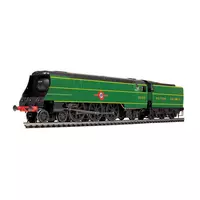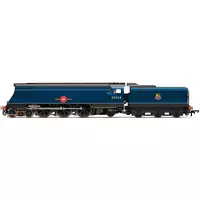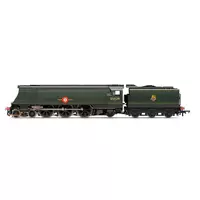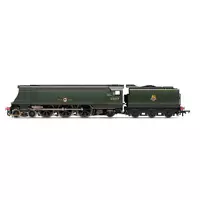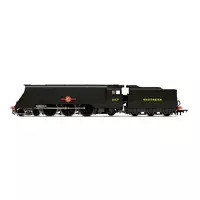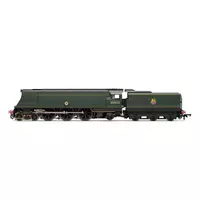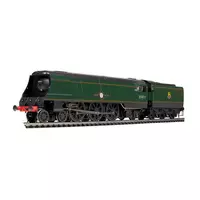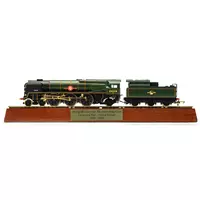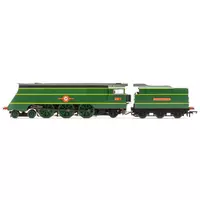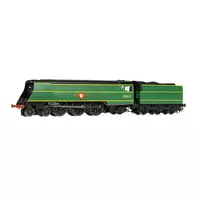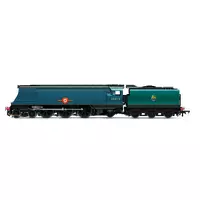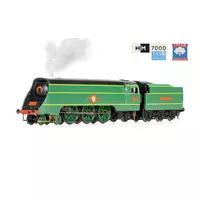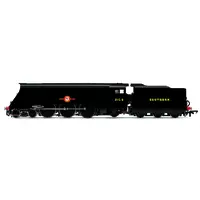Manufacturer catalogue image - please note that pre-release images may be CAD renders or CGI images rather than photographs
Prototype Eras
Era 4 (1948 to 1956) British Railways Early Crest
Era 5 (1957 to 1966) British Railways Late Crest
Manufacturer description
Conceived in 1937 when Oliver Bulleid became Chief Mechanical Engineer of the Southern Railway. The Merchant Navy Class represented Bulleid's vision for a quick accelerating, mixed traffic 4-6-2 locomotive equally capable of hauling passenger services (such as the Golden Arrow and Atlantic Coast Expresses), or freight workings to a speed of around 75mph.
In 1934, Bulleid had been opposed the use of streamlining but for the Merchant Navy's 'air-smoothed' design it suited his purposes, being easy to clean mechanically and hiding the boiler's external pipes, which, in turn, meant they could be run for function rather than aesthetics. Of all the new features Bulleid incorporated into the design. Perhaps the most ingenious and, ultimately, most controversial, was his decision to totally enclose the valve motion in an oil bath to prevent attritional wear through grit ingress. Despite the onset of war in 1939, Bulleid's design was accepted by the wartime Railway's Executive Committee and production commenced through November 1940 at Eastleigh Works, the first loco, 21C1 Channel Packet being named on March 10, 1941.
The reaction to the new design was divided into two camps: The footplate staff were dramatically in favor whilst the maintenance staff cursed the design, but it was Bulleid's departure from the Southern in September 1949 that decided the fate of his air-smoothed Pacific locomotives. Reliability, ease of maintenance and the complete withdrawal of steam were high on British Rail's priority list and for a while there was the distinct possibility that the class would be scrapped.
By 1954 it was apparent that steam would continue to be required, at least over the next decade, and consideration was given to the rebuilding of the Merchant Navy locomotives, incorporating the existing boilers and fireboxes. A report by the CME's office at Brighton in January 1955 recommended this course of action and in February 1956 a totally rebuilt and very visually different 35018 British India Line emerged from Eastleigh Works, to be followed over the next three years by the remaining twenty nine, 35006 Peninsular & Oriental S.N.Co. being the last in October 1959.
Maintenance was now easier, but the train crews did not find the rebuilt engines to offer the improvements hoped for by Brighton in their report. As Bulleid pointed out, every negative levied at his original design had already been anticipated and costed whilst any savings through rebuilding related to theoretical improvements only. Withdrawal of the class commenced in February 1964, their traditional workings being taken over by Warship class diesel-hydraulic locomotives and the final seven engines were withdrawn during 1967, with the end of steam on the Southern region. Eleven of the class were eventually saved from the cutter's torch and now survive in various states of preservation across the country.
35030 Elder Dempster Lines was the last of the Merchant Navy class to be built, entering traffic on April 1, 1949. The rebuilding from its original air-smoothed form came between March and the end of April 1958, having covered just over 350,000 miles. Re-entering traffic at Nine Elms, in September 1964 35030 moved to Weymouth where it stayed up to April 1967. There was then a brief return to Nine Elms for three months, prior to withdrawal in July.
Catalogue listing
Model details
Prototype information
* Class names often change over the lifespan of a locomotive, so this is not necessarily the class name used by the operator in the period modelled.
Supplier links are provided for your convenience and do not guarantee that the product is currently available. RailwayModels.uk is not a representative of these suppliers, but may receive a commission when purchases are made through links on this page.


